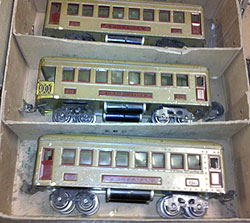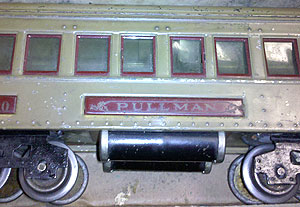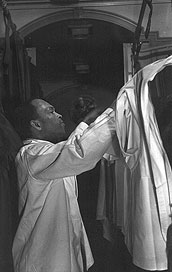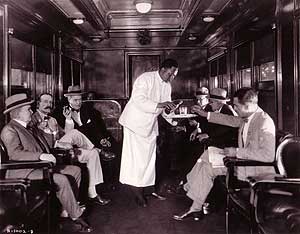For some reason I can’t figure, I love model trains. So, when I saw tables of them at auction a week ago – Lionels, Tyco and other brands in original boxes, and some with no boxes – I was immediately drawn to them. About one-third of the tables in the auction house were devoted to model trains and toys.
They apparently had been the collections of more than one person because they had different lot numbers. Along with the trains were a set of Pennsylvania Railroad glasses, tracks, model buildings, transformers, books and pamphlets, photo albums and metal tins of slides.

Everything was gobbled up by dealers and serious hobbyists. The most expensive – which drew cheers and claps from the bidders – was not a train but a stack of Pennsylvania Railroad posters and calendars from about 50 years ago. They went for $3,750.
While I was perusing the tables before the auction began, I was stopped in my own tracks by a familiar name on one of the trains: Pullman. I immediately thought about Asa Philip Randolph and the Brotherhood of Sleeping Car Porters.
Several of the trains with the Pullman name were lying there flat on the table, in boxes. I wasn’t around when the bidding commenced, so I’m not sure how much they sold for. I didn’t even bother to bid because this was a specialty auction, and I’ve seen trains sell for hundreds of dollars.
But my recall of everything I had heard and read about Randolph and the Pullman porters had been activated. I remembered watching the 2002 Showtime movie “10,000 Black Men Named George” about the porters’ struggle to form a union. The George in the title referred to the name white passengers gave to all black porters in reference to company founder George Pullman. (Some porters apparently pointed out that they had a name, gesturing to their name tag).

I remembered what I knew about the Pullman porters – that they were away from home for long stretches, that these were some of the best-paying jobs despite their indignities and that Randolph fought hard to get them recognized as a union.
George Pullman, who founded the Pullman Palace Car Company in 1862, created the first sleeping cars – which provided luxury at a price – and hired black men to service his clientele. The trains were known as “hotels on wheels,” where white passengers could converse in lounge cars, dine in dining cars and get their rest on in sleeping cars. The service was first-rate, supplied by the 20,000 Pullman porters (that was the number by the 1920s) who tended the passengers’ every wish and whim.
 It was a job that gave the men status in their communities and a middle-class lifestyle. But it was not so grand for them on the trains, though. They made most of their money in tips, which meant they likely had to bow a little lower to get good ones. Among other things, they worked long hours for low pay. (Photo at left is from the Pullman State Historic Site website.)
It was a job that gave the men status in their communities and a middle-class lifestyle. But it was not so grand for them on the trains, though. They made most of their money in tips, which meant they likely had to bow a little lower to get good ones. Among other things, they worked long hours for low pay. (Photo at left is from the Pullman State Historic Site website.)
Tired of poor wages and bad working conditions, they organized the Brotherhood of Sleeping Car Porters in 1925, calling on activist Randolph to help them. Their motto: “Fight or Be Slaves.”
They, obviously, were rebuffed by Pullman, along with some in the black community where the company had won converts for years through its benevolent giving. It would be 12 years before the union signed a contract with the company – 1937 – the first black union to win a collective bargaining agreement.
Randolph went on to become very active in the civil rights movement; he was one of the leaders of the 1963 March on Washington. The A. Philip Randolph Pullman Porter Museum was opened in Chicago in 1995 to honor him and blacks in the labor movement. The A. Philip Randolph Institute carries on the civil rights mission of Randolph and Bayard Rustin, another organizer of the march.
Many porters were also activists (Randolph had worked as a porter). E.D. Nixon – a civil rights leader in Montgomery, Ala., who headed the Pullman union there – drafted Rosa Parks in 1955 to take her heroic and historic seat and tapped Dr. Martin Luther King Jr. to lead the Montgomery bus boycott. I remember interviewing Nixon when I was a reporter at the morning newspaper in Macon, Ga., in the 1970s, and he told me that story. I did not know at the time, though, that he had been a Pullman porter.
Trains – toy and real – conjure all kinds of memories for people, but for me, they will always be about the porters. They made history – whether they knew it or not. (Photo below is from the Pullman State Historic Site website.)

